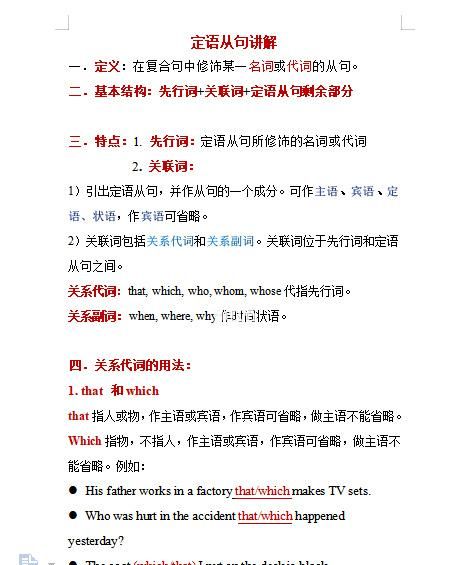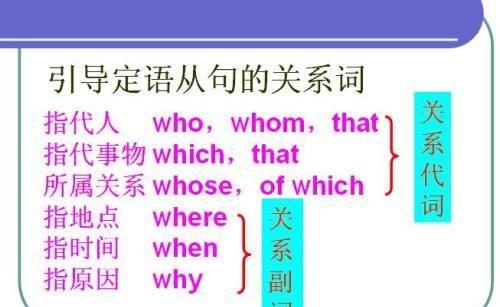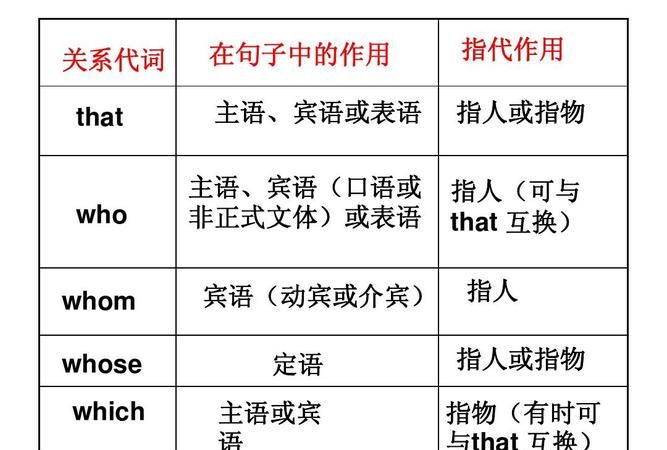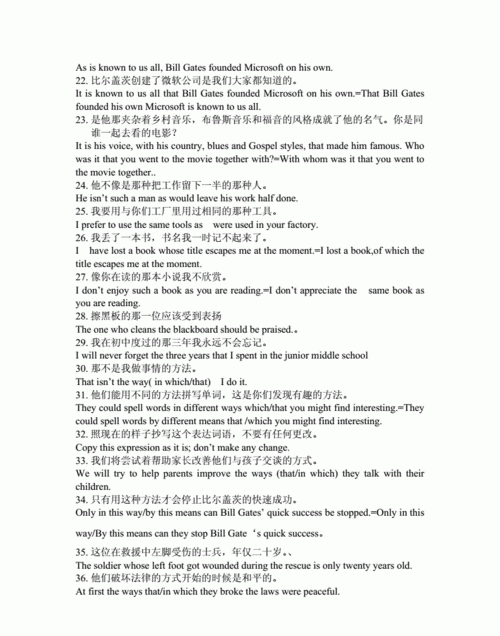本文目录
定语从句和被动语态的用法
定语从句就是修饰【名词】的句子。
I have a carpet which can fly 我有一张可以飞的地毯。【物】【which】可用that
he is a boy who can lift this stone .他是个能举起这石头的男孩。【人】【who】 可用that
其中【who can lift this stone】就叫定语从句,修饰名词【boy】的句子。who在这里就不用翻译,你直接看做he is a boy ,【他是个男孩】he can lift this stone【他能举起这石头】。合起来念就是了。
当然有很多,人就用who ,物就用which,人和物一起就用that ,that在很多情况可以用,你记住这些就行了。还有很多种,一时说不完吖。打字很累。你可以去找找相关资料,我这里只是简单的说它的定义。
被动语态就是什么什么被怎样了。通俗的说就是中文的“被”句。比如:
the tree was cut down .这树被砍倒了。
we cut down the tree . 我们把树砍倒了。
这就是中文的“被”和“把”句。仔细看看,被动语态一般要有be动词。如例句the tree was cut down 。有be 动词【was】be动词后面要加分词【过去分词和现在分词】哦。那些要去背的。
下面是其他被动语态:
the cup was broken 。杯子被打碎了。
the man was killed。这男的被杀死了。
my idea was chosen 我的点子被看中了。
【附】被动语态还可以在后面加by ……【被……】翻译为【被谁】或【被什么】。再看例句
the cup was broken by him 杯子被他打碎了。
the man was killed by this knife 这男的被这把刀杀死的。
my idea was chosen by my boss 我的点子被我老板看中了。
求采纳。

双重定语从句例句语文
双重定语从句例句1
例句:
1.He was a man whom all his friends admired and who won the respect even of his enimies. 他是个令其朋友全都钦佩的,甚至赢得敌人尊敬的人。
2.He wants you to know that anyone who chooses the path he has chosen is sure to have periodic holiday in jail.他希望你了解,凡是选择了他所选择的那条道路的人,肯定会要定期地到监狱里去度假的。
3.I am the infamous creature you have heard of that lives among the thieves. 我就是你们曾经听说过的那个声名狼藉,跟盗贼为伍的女人。
4.Just consider that we use hardly one hundred thousandth of the heat that there is in coal and could be extracted from it. 请想一想,储藏在煤里并可以提取的热量,我们用的还不到十万分之一
5.He's the person (whom)I meet at the club every day and whom I've invited home to dinner tonight. 他是我每天在俱乐部碰到的那个人,我已邀请他今晚到我家进餐。
定语从句误区提醒:
1)当表示时间或地点的名词作先行词时,要判断出它们在从句中作状语还是主语或宾语。作状语时用关系副词,反之用关系代词。
典型例题:I can never forget the day _______ we worked together and the day ______ we spent together.
A. when; which B. which; when C. what; that D. on which; when
答案:A
解析:两个先行词the day都是表示时间的名词,但第一个空白处要填的关系词在从句中作状语,因此要用关系副词when.第二个空白处要填的关系词在从句中作动词spent的宾语,因此要用关系代词which或that来引导定语从句.
2)当主语为物时,不能用what
3)there be句型中,指人用who指物用that。
4)当主句中缺少主语或表语时,用the one。
5)当出现先行词+介词时,关系词只能用whom或which
6)当出现先行词+介词时,注意判断介词与从句谓语是否有关系,以确定为定语从句
双重定语从句例句2
英语中的双重定语从句指一个句子中含有两个定语从句,其层次不同,修饰的先行词也不同。我们将这种情形称之为:双重定语从句。如:
(1)The boss at last got a chance to visit the village (where he used to work)定语从句1,(which he had been dreaming of for 20 years.)定语从句2
老板终于得到机会去访问他工作过的村庄,他一直梦想了20年。
(2)America has more than fifty states,(one of which,Kentucky,)定语从句1(is the place where Abraham Lincoln was born.)定语从句2
美国有50多个州。其中之一的肯塔基州是林肯出生的地方。
有时, 这种双重定语从句可以一个短语加上一个定语从句,构成双重定语。如:
She has a dream (of becoming a dancer)定语1,(which is what her fatherexpected her to before his death.)定语2
定语1为介词短语作定语,定语2为定语从句,修饰dream。
有时,这种双重定语的定语从句可以另一种形式出现。如:
She has a dream (of becoming a dancer,)定语1 one (that is what her father expected her to before his death.)定语2
定语1为介词短语作定语,one为dream的同位语,定语2为定语从句,修饰one。
从上我们可看到,句子出现双重的定语从句的现象,无疑在更丰富地表达意思的同时,也增加了读者理解句子的难度,尤其对于英语初学者而言, 因此我们不可忽视这种想象。那么,英语中除了“双重定语从句”,还有那些“双重结构”呢?每种双重结构又要注意哪些方面呢?
一、双重宾语
指有些动词短语,短语本身含有一个宾语,加上短语的宾语构成双重宾语。这种动词短语往往可演变成两种不同的被动语态形式,或两种不同的定语从句,使得句子较难理解,加深学生解题的难度。
(1)We should make full use of presently-existent natural resources.
被动1:Full use should be made of presently-existent natural resources.
被动2:Presently-existent natural resources should be made full use of.
(2)We should be clearly aware of presently-existent natural resources we should make full use of.
or:We should be clearly aware of presently-existent natural resources which should be made full use of.
避免出错的方法:
1.找准主词,理清句子结构;
2.谨防使用被动语态时,遗漏相应的介词。
如:What we should attach importance is that many natural resources can’t be produced again.(×)
What we should attach importance to is that many natural resources can’t be produced again.(√)
You can take whichever measure you consider it is the best.(×)
You can take whichever measure you consider is the best.(√)
(把it删去,因为它与measure的成分重叠。我们可把you consider看作插入语,即,whichever measure is the best,you consider.)这种短语常见的如下:
make use of...
pay attention to...
make the most of...
attach importance to...
devote one’s life to...
fix one’s eyes/mind/attention on...
双重宾语转变成的被动形式,是指有两种被动形式,有别于以下第二点所指的双重被动。请看这两种类型的主、被动形式:
(1)双重被动:
The rules in the library allows readers to take the book out of the library.
被动:The book is allowed to be taken out of the library.
(2)双重宾语的被动:
We should make full use of presently -existent natural resources.
被动1:Full use should be made of presently-existent natural resources.
被动2:Presently-existent natural resources should be made full use of.
二、双重被动句
指除谓语动词用被动外,再加上被动的动词不定式,即构成了双重被动句。注意双重被动句的主语既是谓语动词动作的承受者,又是后面谓语动词动作的对象。
(1)The books are not allowed to be taken out of the reading room.
这些书不准带出去阅览室。
(2)His brother is said to have been born abroad.
他弟弟据说是在国外出生的。
三、双重疑问句
指一个句子中包含两个问句,一主一从,但实际上只表达一个疑问的句子。常使用以下结构:
do you think
疑问词+ can you guess等+陈述句?
did you say
此结构又称复杂疑问句,常用来征询对某一疑点看法、判断、认识、猜测和请求。表疑问的插入语可位于句中或句末。作题时要防止插入语干扰对句子结构的整体理解。
(1)What do you think are the greatest dangers of smoking?你认为抽烟最大的危害是些什么?
(2)Whenwill the meeting be held,do you think? 你认为会议什么时候召开?
四、双重否定句
指一个句子中除谓语动词否定外, 还存在另一个否定概念,即为双重否定句。起加强语气的作用或表示委婉口吻,实际含肯定意义。
(1)You can’t make something out of nothing.巧妇难为无米之炊。
(2)Mancan’t live without air and water.人离开空气和水就不能活。
(3)Don’t touch anything unless your teacher tells you to. 未经老师许可,不要动任何东西。
(4)There is nobody but knows this matter.此事无人不知。
注意谚语和现代英语中常使用省略式,如:
(1)No pains,no gains.不劳而获。
(2)No investigation,no right to speak.没有调查,就没有发言权。
(3)Nothing venture,nothing have.不入虎穴,焉得虎子。
五、双重所有格
英语中把of短浯和’s所有格结合在一起所表示的所有关系称作“双重所有格”。在“双重所有格”中,of之前所修饰的名词通常指整体中的部分和一个。在“双重所有格”中,of之后只能用于有生命的名词。
使用“双重所有格”应注意几个问题:
1.在“双重所有格”中,of前的名词是非限定的,可受不定冠词、数量词、指示代词、疑问代词、不定代词的修饰。
(1)Miss Smith is a friend of Mary’s mother’s.史密斯小姐是玛丽母亲的'一个朋友。
(2)Three students of the teacher’s have been praised. 老师的三个学生受到表扬。
(3)Which daughter of Mr Brown’s did he marry? 他娶了布朗先生的哪个女儿?
2.如受指示代词的修饰,可使句子披上一层感情色彩。
(1)That little girl of your brother’s is really lovely.你哥哥家的那个小女儿真可爱。
(2)I love those articles of my classmates.我喜欢我们班同学的那些文章。
3.在“双重所有格”中,of前的名词不能是专有名词,也不能受到定冠词的修饰。
She is Mary of Mrs Brown’s.(×)
She is Mrs Brown’s Mary.(√)
Mary is the daughter of Mrs Brown’s.(×)
Mary is the daughter of Mrs Brown.(√)
英语的双重结构形式多样,他们的存在一方面使得句子在理解的层面上增加了难度,如果出现考题上是极易丢分的。在平时的语言教学过程中应重视结合语境,对各种形式的双重结构的分析和指导,抓住各种形式的基本特征,理清句子结构,克服有些定时思维,强调容易出错的关键点;另一方面,引导学生理解、欣赏,从而尝试表达运用,写出较为地道的句子,推动书面表达水平的提高。

定语从句中的被动语态be动词
directed是对的,directed by Ang Lee won five Oscars, 是作为the film的定语

需英语定语从句和被动语态的句子.各50句怎么写
被动语态的句子
1.Visitors are requested not to touch the exhibits
2.I was given ten minutes to decide whether I should reject the offer
3.A new cinema is being built here.
4.A meeting was being held when I was there.
5.All the preparations for the task have been completed, and we're ready to start.
6.He is respected by everybody.
7.The play was written by Cao Yu.
8.She was born in Hunan Province.
9.They were given a warm welcome.
10.Two brids were killed last night.
11.The picture was painted by Judia.
12. The butter is kept in the fridge.
13. The window was broken.
14.She was operated on yesterday.
15. He was discriminated against.
16.His house has been broken into.
17. It can’t be done in a day.
18.It must be done right now.
19.The plan should be revised.
20.The work has to be finished tonight.
21.She asked to be given a job.
22.There is nothing to be done.
23.She hated being treated like that.
24.I heard the song sung in Italian.
25.He was made to work long hours.
26. She was asked to sing a song
27.The boy was told to go to bed.
28.He was made their leader.
29.She was called Big Sister.
30. This must be kept a secret.
31.He was elected chairman.
32.The walls were painted
33.His hair was dyed red.
34. She was set free.
35. She was awarded a special prize.
36. I was given something to
37.I was given a lot of work to do.
38.You are invited to give us a talk in English.
39.The three words are pronounced in the same way.
40.he boy is called Little Tiger.
41.She was brought up by her aunt.
42.The book was written by Dickens.
43.Where were you educated?
44.They were given a warm send-off at the airport.
45.When will the project be completed?
46.We were afraid we wouldn’t be admitted.
47.The result will not be announced until 6 o’clock.
48.Shall I be allowed to go with you?
49.I didn’t expect that I would be asked to speak.
50.The spacecraft will be launched tomorrow.
定语从句
1. The old man who/whom /that we visited yesterday is a famous artist.
2. Miss Wang is taking care of the child whose parents have gone to Beijing .
3. The man with whom my father shook hands just now is our headmaster.
4.The comrade I want to learn from is the one who studies hard and works hard.
5.Anyone who breaks the law should be punished.
6.These who are going to Beijing are the best students of our school.
7. There is a student who wants to see you.
8. The student that won the first prize is the monitor who works hards.
9.I met a friend of mine in the street, who had just come from Japan.
10.I like the books which / that were written by Lu Xun.
11.The desks (which/that) we made last year were very good
12. I live in the room whose windows face south. (= I live in the room ,the windows of which face south.)
13.The girl about whom they were talking is our monitor.
14. The book in which there are many interesting things was written by Li Ming.
15. Is this the book which she is looking for?
16. The old man who/whom they are waiting for is Professor Li.
17. The child who/whom she is looking after is Wang Ping’s son.
18.We are willing to do anything that is good to the people.
19.I have told them all (that) I know.
20.All that can be done has been done.
21. The first book that I read last night was an English novel.
22. This is one of the most interesting films that I have ever seen.
23.This is the best that can be done now.
24. We know nothing about the doctors and the hospitals that you are talking about.
25.There are sheep and men that can be seen on the hill.
26.This is the only book that can be lent to you.
27. Which is the dictionary that he used yesterday ?
28.This is the factory in which we once worked.
29. He knows as many people as are present at the meeting.
30. Such people as you refer to are rare nowadays.
31.Those which are on the desk are English books.
32. This is the book, which is written by Lu Xun.
33.He was late again, as / which we had expected. =As we had expected, he was late again.
T34.he street hasn’t been cleared for weeks, which makes it very dirty.
35.The young man cheated his friend of much money, which was disgraceful.
36.He takes exercise everyday, which has done a lot of good to his health.
37.As has already been pointed out, English is rather difficult for a foreigner.
38.Such books as this are too difficult for beginners.
39.I live in the same building as he (does).
40.He knows as many people as are present at the meeting.
41.He is the only one of the teachers who knows French in our school.(
42.That is one of the books that are required for study at school.
43. This is one of the most wonderful novels that have been published since 1990.
44. She is one of the few persons who know Spanish .
45.This is one of the most famous plays that were written in the thirties,
46.That day we all got up early as usual.
47.They rushed over to help the man whose car had broken down.
48. Please pass me the book whose (of which) cover is green.
49.Is he the man who/that wants to see you?
50.The package (which / that) you are carrying is about to come unwrapped.
希望能帮上忙~~

以上就是关于定语从句的被动语态例句 ,定语从句和被动语态的用法的全部内容,以及定语从句的被动语态例句 的相关内容,希望能够帮到您。

